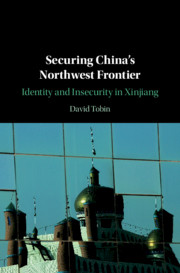Book contents
- Securing China’s Northwest Frontier
- Securing China’s Northwest Frontier
- Copyright page
- Dedication
- Contents
- Figures
- Abbreviations
- Introduction
- 1 Securing China on the Multi-Ethnic Frontier
- 2 Mass Education as an Identity-Security Practice
- 3 ‘East Turkestan’ in China’s Identity and Security Narratives
- 4 Identity and Insecurity after ‘7-5’
- 5 Performing Inclusion of the Uyghur Other
- 6 Han and Uyghur Narratives on Ethnic and National Identity
- 7 Han and Uyghur Narratives on Identity and Insecurity
- Conclusion
- Book part
- Bibliography
- Index
Conclusion
Identity and Insecurity in Xinjiang
Published online by Cambridge University Press: 18 September 2020
- Securing China’s Northwest Frontier
- Securing China’s Northwest Frontier
- Copyright page
- Dedication
- Contents
- Figures
- Abbreviations
- Introduction
- 1 Securing China on the Multi-Ethnic Frontier
- 2 Mass Education as an Identity-Security Practice
- 3 ‘East Turkestan’ in China’s Identity and Security Narratives
- 4 Identity and Insecurity after ‘7-5’
- 5 Performing Inclusion of the Uyghur Other
- 6 Han and Uyghur Narratives on Ethnic and National Identity
- 7 Han and Uyghur Narratives on Identity and Insecurity
- Conclusion
- Book part
- Bibliography
- Index
Summary
Cycles of violence and insecurity in Xinjiang are reproduced on the ground through relations among Han, Uyghurs, and an ethnocentric state. This book has shown how the party-state’s securitisation of Zhonghua Minzu identity produces multiple identities and insecurities in Xinjiang. These multiple identity-insecurities make the party-state more insecure and it responds with more securitisation, perpetuating cycles of mistrust and violence in the region. The party-state’s production of Zhonghua Minzu, perpetually encircled and infiltrated by multiple threats to China’s identity, hierarchically organises difference between superior, safe Han and inferior, dangerous minorities. Hierarchical nation-building reinforces the differences it aims to convert by targeting Uyghurs as perpetual identity-threats, exacerbating existential insecurities between and amongst Han and Uyghurs on the ground. Targeting Uyghur language and religion as existential threats to China leads Uyghurs and Han to securitise their own identities against perceived threats from each other and the state. The party-state, therefore, exacerbates spiralling cycles of ethnicised violence in Xinjiang that produce the perceived need for nation-building, further perpetuating these cycles and the impossibility of security.
- Type
- Chapter
- Information
- Securing China's Northwest FrontierIdentity and Insecurity in Xinjiang, pp. 222 - 243Publisher: Cambridge University PressPrint publication year: 2020

